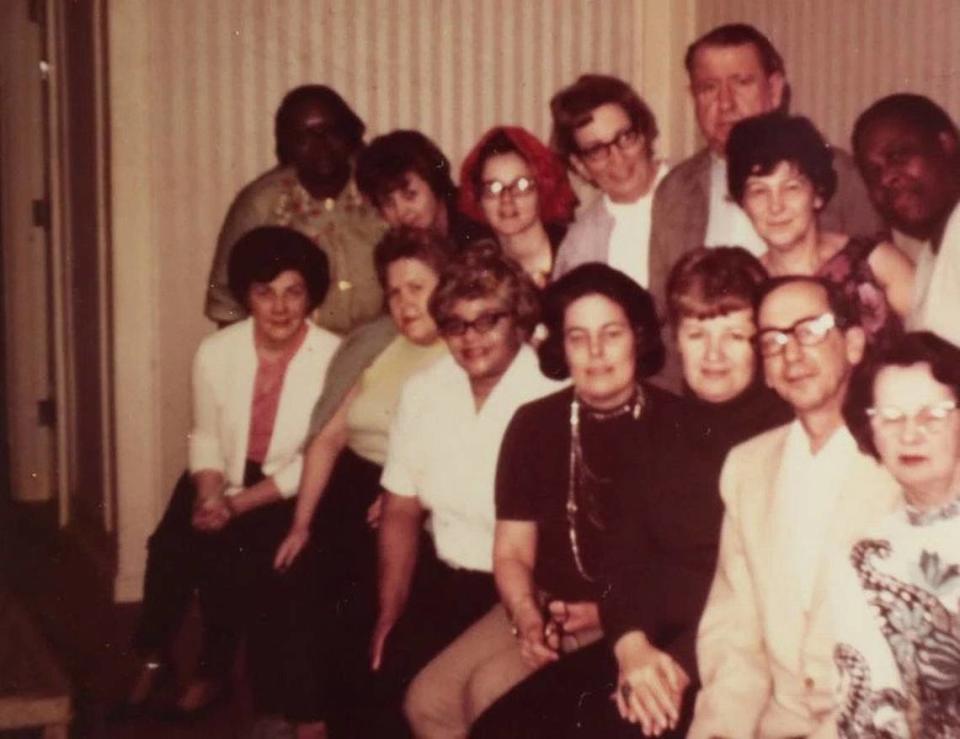After Chicago 7 trial, Mrs. Jean Fritz helped change the course of history | Opinion
This is a good time to remember Mrs. Jean Fritz.
Fritz was a juror in the Chicago 7 trial, which is back in the news thanks to Aaron Sorkin’s movie, “The Trial of the Chicago 7,” which debuted Friday on Netflix. It’s a story that has been told many times, typically with the focus on the men accused of coming to Chicago in 1968 to incite a riot during the Democratic National Convention.
You may know some of their names. Abbie Hoffman. Tom Hayden. Jerry Rubin. But Mrs. Jean Fritz? That name, as she was often referred to back then, is less familiar. She was one of the so-called ordinary people chosen to sit in judgment of those famous men.
I wrote a long story on Fritz a couple of years ago, based on the journals she kept while on the jury. They’re a remarkable record of a woman and of the times, and of how the times changed her. When the trial started, in September 1969, Fritz was what the press referred to as a “housewife.” In truth, she also worked alongside her husband at their Western Auto store in the Chicago suburb of Des Plaines. She was 51, had three daughters, wore her hair in the bouffant style and taught Methodist Sunday school. She considered herself politically moderate, but in the 1960 election voted for the Republican, Richard Nixon, who lost to the Democrat, John F. Kennedy.
By the time of the trial, during Nixon’s eventual presidency, the country was driven by fear and anger, a state of division and disarray that was remarkably like today’s, yet different. The news back then was of war in Vietnam, the fight for civil rights, street riots and rebellions, political assassinations, cries for law and order, a clash of generations.
A common conservative view of the era was reflected in a Chicago Tribune opinion piece that characterized Woodstock, the 1969 summer music festival, as “a Saturnalia attended by hundreds of thousands of frenzied aberrants of the human species.”
Fritz was not conservative in that way, but she expressed a conventional attitude when, early in her trial journals, she noted her fear that young people didn’t share her appreciation for “the most wonderful country in the world.”
“Have always had a great love for my country,” she wrote. “Always get chills when I see a parade and the flag goes by. What is happening today?”
But as the trial went on, as she heard how protesters were mistreated by police and deceived by government informants, her mind opened and her fears shifted.
”I used to make remarks about boys with long hair,” she wrote at one point. “Since I have been (here) I have learned why some of them have it. Will never judge people again on their appearance.”
After testimony from undercover agents, she wrote: “I know we need police and am all for them. But I don’t like people like this and have sure learned not to trust a lot of things. . . . (I) am getting more afraid for our freedom every day that I sit here.”
At the trial’s end, the bitter, fractured jury reached a compromise verdict that convicted five of the men on one of the charges. Fritz thought they should have been entirely absolved, and for a long time afterward, she felt she had betrayed herself and the defendants by failing to fight hard enough.
Eventually, she spoke out about what she thought had gone wrong. Her outspokenness had a price. ”We got death threats and hate mail,” her daughter Margie Fritz-Birch said when I called her Thursday. “People stopped coming into my dad’s store.”
But Fritz’s views helped lead to an appeals court hearing, which led to a reversal of the convictions. In the long run, the experience made Jean Fritz a better citizen. She became an election judge and a committed student of politics.
”It made her much more conscientious,” her daughter said. “It gave her an eye-opening awareness of the dangers of what can happen when you have the division in the country that you had then and have now.”
Fritz-Birch was wary of the film but planned to see it.
”I hope the film makes people aware, especially younger people, of the similarities between then and now,” she said, “that you are not the only people to go through this.”
Today’s divisions aren’t precisely the same as those that threatened the country in the 1960s. In some ways, they feel more dangerous. But Jean Fritz’s era reminds us that this is not the first time that people, led by the young, have protested in pursuit of a more egalitarian country, or the first time we’ve felt our nation on the verge of collapse.
Fritz’s life gives us hope that individuals can open their minds to the need for change and help make it happen. Maybe one day she’ll get her own movie.
Mary Schmich is a columnist for the Chicago Tribune and winner of the 2012 Pulitzer Prize for commentary.
(c) 2020 Chicago Tribune



